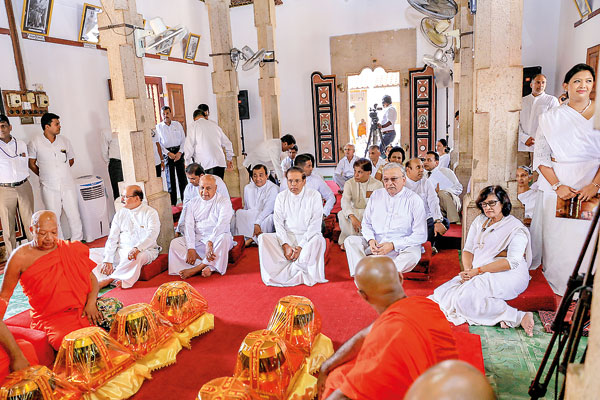News
SLFP-UNP coalition at flashpoint
With badly strained relations between the coalition partners — the Sri Lanka Freedom Party (SLFP) and the United National Party (UNP),– reaching a flashpoint, the next move by President Maithripala Sirisena has become the focal point of attention in political circles. His immediate priority, according to sources close to the presidency, is to replace Prime Minister Ranil Wickremesinghe, with whom many irreconcilable differences have arisen.

Public Enterprises Minister Lakshman Kiriella was conferred the 'Shasanamamaka Janaprasadani' award for his religious and social services at an event organised by the Asgiriya Chapter at the Asgiriya temple in Kandy. President Maithripala Sirisena is seen taking part in a religious ceremony associated with the event.
The latest crisis ignited over President Sirisena’s flat refusal, at last Tuesday’s weekly cabinet meeting, of the Premier’s request, to allow both India and Japan to start a venture with Sri Lanka to operate the East Container Terminal in the Colombo Port. “I will not allow any outside party,” insisted Mr Sirisena. The issue was further clouded by the President’s accusation, later denied, that RAW, India’s intelligence agency, was involved in the plot to assassinate him.
Even before the ECT imbroglio, President Sirisena had initiated a dialogue with his predecessor Mahinda Rajapaksa, to form a caretaker grand coalition. In that, he sought to replace Mr Wickremesinghe with Mr Rajapaksa as the Prime Minister.Though Sirisena denied to his party seniors this week that they met, more details of the meeting are now surfacing.
Sources close to Mr. Sirisena say “he knows the mechanism to effect a change” but an uncertainty still lingers over numbers – how many MPs could a new regime muster. Behind-the-scene manoeuvres are under way to persuade many MPs. These sources said the coalition, or the “national government,” between the SLFP and the UNP was formed firstly for two years. Thereafter, its continued existence was made possible by United People’s Freedom Alliance (UPFA) General Secretary and Minister Mahinda Amaraweera issuing a letter that the coalition would continue. This was announced in Parliament by Speaker Karu Jayasuriya. It was endorsed by Minister Lakshman Kiriella, Leader of the House, on behalf of the United National Front (albeit the UNP).
If the General Secretary Amaraweera writes to the Speaker to say he was withdrawing such a letter, the sources said, “the government including the Prime Minister and the Cabinet would cease to exist.” There was widespread speculation that Mr. Ameraweera had handed over to Mr. Sirisena such a letter undated. However, this could not be confirmed. It is known that the UPFA General Secretary maintains a very close rapport with the UNP.
The UNP, too, is taking a close look to see whether it could get seven or more MPs to support it so that it may form its own government. Given the likelihood of divided loyalties on both sides of the divide, it is difficult to forecast who will emerge winner. At present, the UNP has 106 seats, the UPFA 95 (of which’Joint Opposition – 54, SLFP rebels 15) and pro-Sirisena SLFP 23. The Tamil National Alliance has 16, the Janatha Vimukthi Peramuna 6, Sri Lanka Muslim Congress 1 and the EPDP 1.

